Can You Wear Religious Jewelry to the Office? (Should You?)
This post may contain affiliate links and Corporette® may earn commissions for purchases made through links in this post. As an Amazon Associate, I earn from qualifying purchases.
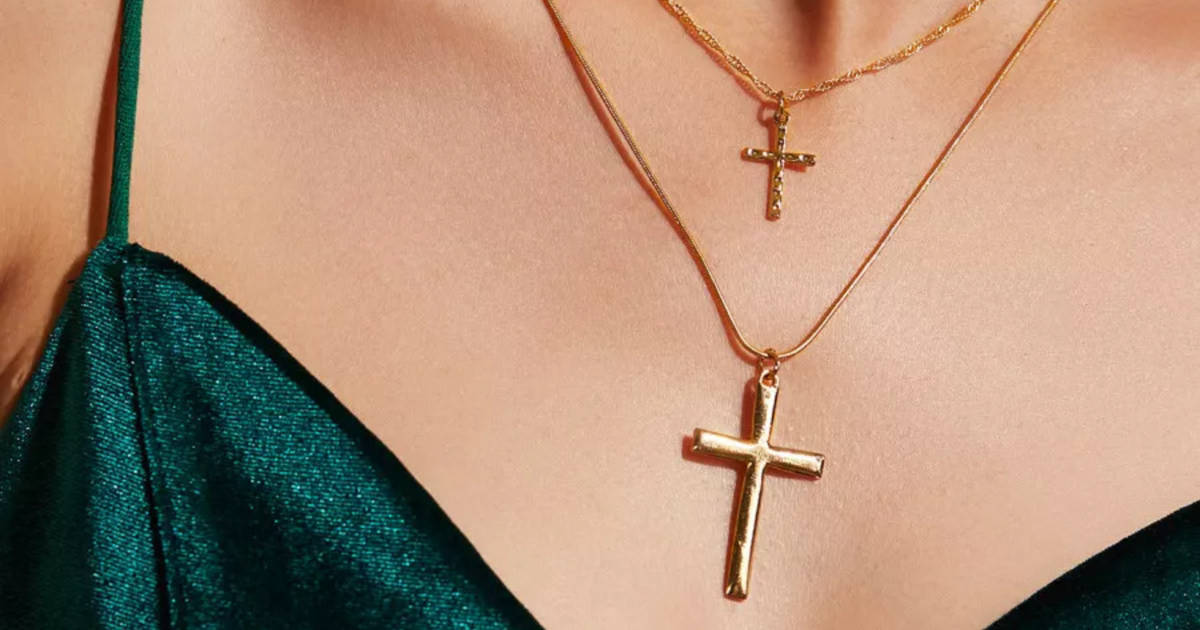
Can you wear religious jewelry to the office? Reader S wonders if it's appropriate…
I was wondering what you and all of the other readers think about wearing religious jewelry to work. I'm not talking about a head covering, or skirts as required by a religion, but more along the line of wearing a Star of David or Crucifix to work. If its small, and simple is that OK, or do readers tend to shy away from that?
The easy answer is: of course you can wear religious jewelry if you're working for a private company. (I'm not actually up on the laws regarding state workers or public school teachers or the like — there may be special rules for those jobs.)
If your boss or coworkers have a problem with silent displays of religion, I suspect there are several people in your organization and community who will want to know about it. (Pictured at top: Shein. More expensive: Elsa Peretti Infinity Cross pendant, still available at Tiffany & Co (2018).)
Hunting for great jewelry for the office? As of 2024, we're long been fans of affordable brands like Mejuri and Jenny Bird, as well as mid-tier brands like Monica Vinader, David Yurman (especially this line), Dana Rebecca, and Stephen Dweck. For our $.02: spend money on things like a good watch (or watch strap), gold or diamond earrings, a pearl necklace, and more. Some of the earrings we've featured recently:
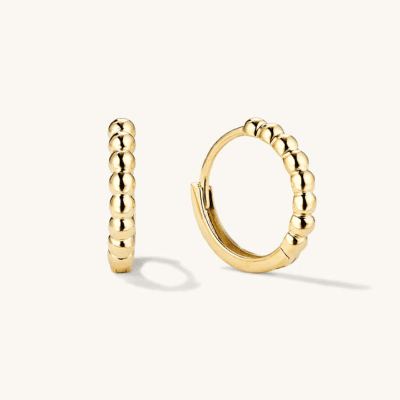
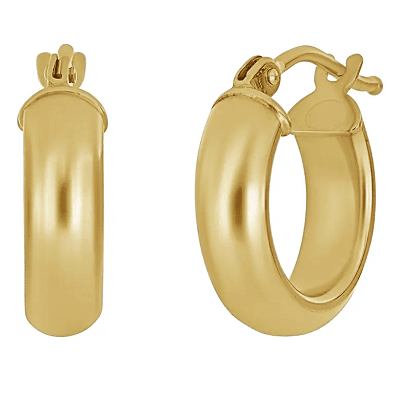
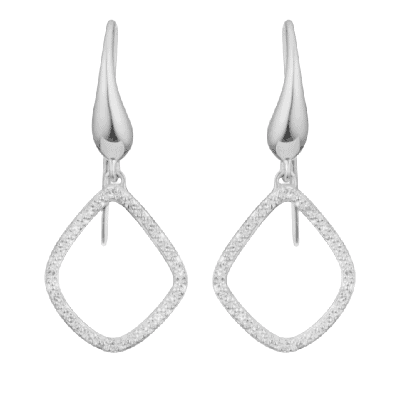
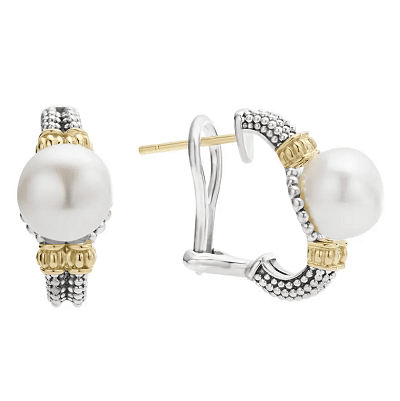
And some of the necklaces:
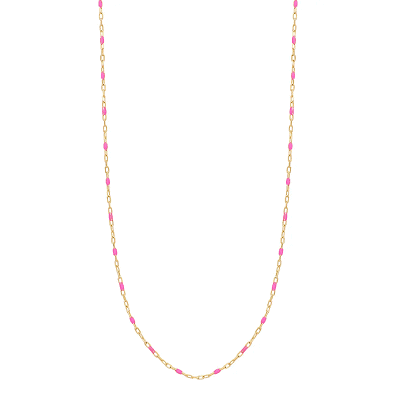
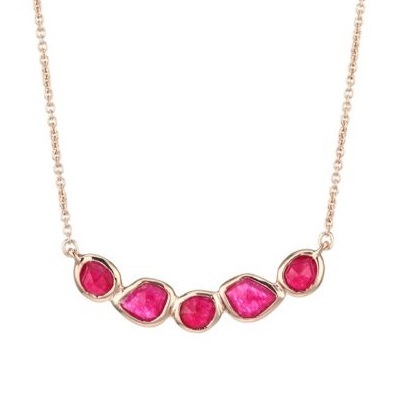
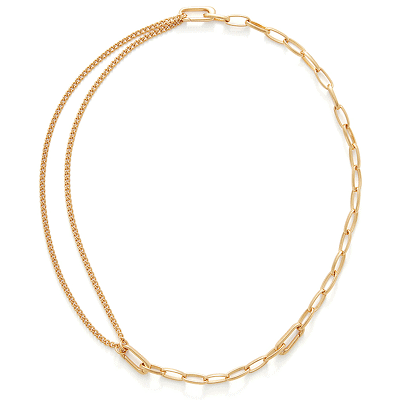
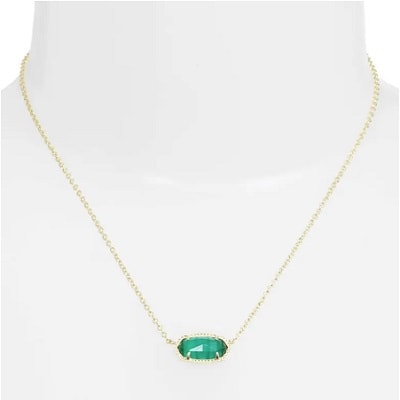
The harder answer is: religion is a touchy subject, and ultimately I'm not sure what to say. (And I'll be very curious to hear what readers have to say!) I have worn crosses from time to time, but tend to do so only when I'm actively praying (for a sick relative, or a friend suffering a loss, etc) — and sometimes I'll wear it under a sweater because I want to keep my thoughts to myself.
I think there's a difference between wearing a piece of jewelry and actively trying to “recruit” people to your religion, and I would generally advise against the latter, at least at the office.
{related: how to build a tasteful jewelry collection}
(Full disclosure here: I'm a cafeteria Catholic who rarely goes to Mass, and while I consider myself spiritual I don't consider myself religious. I also live in NYC, where people don't generally talk about religion.)
{related: how much jewelry should you wear to work?}
Readers, what are your thoughts? Can you wear religious jewelry to the office — or should it be kept out of the workplace? (And if so — why?)
Psst: here are Kat's latest favorite ways to store jewelry…
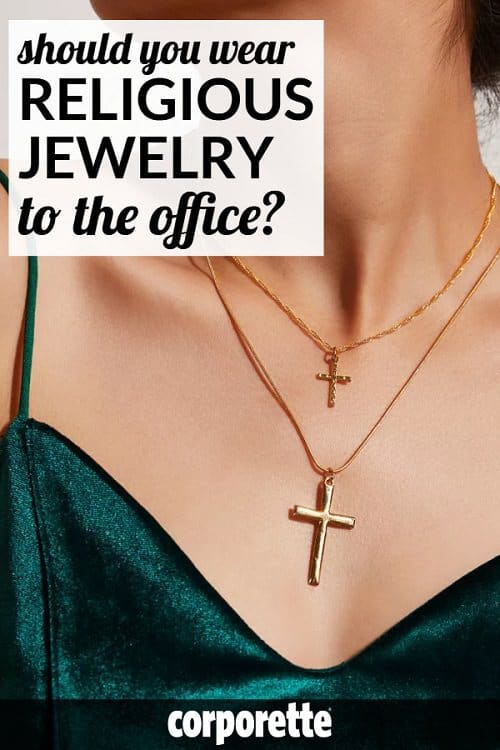


Some of us practice religions whose symbols we can’t wear, lest we be subject to discrimination. I see that the vast majority of the posters who are talking about religious symbols keep referencing Christian and Jewish symbols primarily.
There are places in this country where you risk your professional livelihood if you let people know you’re Muslim. There are many, many places in this country where you will not get a job if you wear a pentagram, or if people know you practice an African diaspora religion.
When I see a cross on somebody’s neck in a professional context, it frustrates me. The individual wearing it is showing a privilege which goes along with being a member of a mainstream/majority faith, and it’s something I will probably never get to do in my professional life. I don’t necessarily think that such people are being out-and-out mean or nasty, but I do think they’re utterly clueless about the social context and how their little cross necklace represents a wide gulf in privilege and social acceptance.
Similarly, I think most of the posters in this thread are clueless. If somebody ever asked me, “Would it be okay to wear religious jewelry at work?” my first question would have to be, “Well, which religion?”
Are you similarly frustrated when you see a nice handbag on someone’s arm or see them pull into the parking garage in a fancy new car? These are symbols of privilege too. Do you consider these people “utterly clueless”?
Speaking only for myself, I don’t, but I do think people who talk about fancy handbags and cars without demonstrating an awareness that they’re something only a few people can afford to own are clueless. I think S makes a very good point that only thinking about, for instance, Christian religious symbols and how they’re received is similarly clueless.
Anon, I think the poster means a different type of privilege than monetary. The OP is likely referring to the type of privilege we have without being aware of it if we are white or male or upper class or able-bodied. And, IMO, the OP is correct: displaying a cross or a Star of David is a mark of privilege because those religions are generally accepted throughout the world (though I’d argue that the Star of David is less acceptable in many areas, including parts of the US).
So because you don’t feel “comfortable” expressing your faith, no one else should get to do it either? I’m sorry that you’re in the minority, religion-wise, where you are, but I don’t see why that means those in the majority should have to censor their jewelry so you don’t feel uncomfortable. The fact that the majority exists is not a personal affront to you.
It’s respectful to try and put your colleagues at ease, though.
First off, talking about my not being “comfortable” because I’m in the “minority” “where” I am is a total non-sequitur – my religious faith is a minority -everywhere- and I’m not talking about simply having minority status, but being actively discriminated against; way to try to downplay the seriousness of what I was talking about, though.
More to the point, where did I even remotely suggest that people’s jewelry should be “censored”? I was only pointing out the larger social context of wearing such things. I’m not saying anyone should be at all obligated to remove religious jewelry, but you have to accept that neither is anyone else obligated to pretend that the choice to wear optional jewelry has no larger social context. We do not exist in a vacuum.
We’re having a discussion about how sometimes a small group of people might somewhat negatively view a person who has a cross, or may even choose another professional with whom to do business (*gasp* The bias!). If the original reader had posted about wanting to wear certain OTHER religious symbols, Kat in her answer could’ve cited numerous court decisions regarding whether businesses could fire somebody based solely on the wearing of the symbols. She probably could’ve combed through US news articles finding instances where people were beaten because they were wearing such symbols, or had their children taken away from them because of their adherence to that faith.
I ask that people keep this in perspective, and keep in mind what other people are experiencing, and all of a sudden I’m trying to oppress Christians with my evil wicked censorship and my outlandish sense of “personal affront”.
Yeah…okay.
Thanks, by the way. A large part of my opinions on this (which seem to match up mostly with yours) come from 1) my experience, which is only vaguely comparable, of being the target of a majority faith, and 2) my lovely and diverse friends, who are mostly not Christians and have some stunning stories of what has happened when they try to celebrate their faith openly, and how being part of a permanent minority of many sorts is a difficult journey.
I have always tried to be mindful of the effect of outward signs of my faith and the resulting unconscious privilege as a result, and seeing your post reminds me yet again.
The people who won’t hire you because you wear a pentagram, or a cross, or a star are the same people who won’t hire you because of your sex, weight, or ethnicity.
Yeah, they’re bad people, but oftentimes they’re powerful ones.
I think we are missing the point of this post . . . there will ALWAYS be a small sect of people that are offended by EVERY choice we make. There are male partners who have complained that I wear pants everyday. so what. There are people offended that I drive a prius. so what. there are people who are offended by __________ insert anything. The point of this post is whether it is GENERALLY acceptable to the MAJORITY of people to wear ANY religious jewelry. If I made choices based on whether it might offend ONE person, I would make no choice on anything in the world.
Well, I think that is the point actually. In much of the United States, wearing a cross necklace IS something that only a few people are likely to be really offended by and you can say “screw the haters”. In the same places, however, wearing, for instance, a necklace that says “Allah” in calligraphy can get you loads of prejudice and discriminatory behavior that’s much more broadly based. Not always and not from everyone, but it’s something people of minority religious faiths that are often persecuted really do have to be aware of. That doesn’t mean Christians shouldn’t wear a cross, but it does mean that they should be aware of the dichotomy.
Yes, so it is our job to try to help them accept others not bow to their bigotry.
I mean, in theory I think this is great. But it’s also something that’s a lot easier to say when you’re not the person facing immediate and significant discrimination. It’s easy to stand up to your bigoted boss when you know that the majority of listeners will be on your side and you’ll likely easily find or another job, or if you have enough money not to care. It’s a lot harder when you know other employers in your region are just as likely to discriminate against you because of your religion as your current boss, and when the economy sucks, and when you have a family to support, etc. And things being what they are, people who aren’t Christian are likely to face the latter situation – at least in terms of it being likely a new employer won’t be any better – a lot more often than people who are. Which is just something to think about when you’re comparing the kinds of religious discrimination people face and the privilege involved.
I think this is a valuable comment.
The bottom lines are these:
If a man doesn’t want to become a father, he should take steps to ensure he is protected when he has sex.
If a woman doesn’t want to become a mother, she should take steps ensure she is protected when she has sex.
Everything else is chatter.
wut
I never wear a visible religious symbol to court, because when I am there, I am not merely “me”, but am primarily a representative of the people (prosecutor). That said, if I am seeking the services of a professional, unless my “issue” is one which someone’s religious beliefs would impact, I couldn’t give a rat’s _$$ whether that professional wears a cross/crucifix, Star of David, pentagram, or other religious symbol.
I’ve always felt religious symbols were like any other symbols. I wouldn’t stop wearing my wedding band because being married made my single colleagues uncomfortable and I wouldn’t expect anyone else to hide a symbol that has meaning to them for fear it would make someone uncomfortable either. I think anything tasteful and elegant is completely work appropriate.
Well said. I completely agree.
This. As long as people don’t try to preach or convert others, it shouldn’t matter. We had a senior manager who invited people (of different religions) home for Christmas dinner and people felt obliged to go there. Afterwards, he put on a video showing how a former drug addict found salvation through Jesus AND had the guests share their views on “What Jesus means to me”. Many found it weird/offensive etc depending on their outlook.
Pity it wasn’t in the US where they could have sued or reported him:)
There has been much focus on how others perceive the jewelry or other symbol of one’s religion. In my opinion, that is not the point. Instead, the believer of a, b, or c religion has chosen to wear the item that is associated with that religion as a visible reminder to her of what she believes. One purpose of that symbol is to help you refocus throughout the day on the tenents of the religion (i.e. you are fixing your hair and see it in the mirror, reminding you of what you believe). The fact that what is hanging from the necklace tells you something about the person in your office gives you a piece of information about that person. It does not tell you all about you need to know about who they are and what they believe.
I think it’s very interesting that none of the cross wearers are posting in from Utah – a land of religious jewelry. No Mormon’s don’t wear crosses ever (it a sign of Christ’s death not his resurrection, in our way of thinking). But both men and women do wear CTR (Choose The Right) and Return With Honor rings. As well as a women who wear necklaces: traditional Christian ones like mustard seeds under glass and Mormon specific ones like the ones earned for completing levels of the Young Women’s program. Also, there are necklaces/tie tacks given out to girls and boys who complete their Gospel in Action requirements at age 12 (a bit like learning the catechism, I guess). Also men may carry key rings that contain vials of consecrated oil for providing blessings. Most of theses things are only recognizable to other Mormons.
Mormon’s I’ve known (as well as myself) are generally very uncomfortable around crosses. Though I suspect the Church’s attempts at mainstreaming will lessen that feeling.
But here’s the thing I wanted to point out: if you, dear cross-wearing sistren, went to Utah, you would be signaling that you are NOT part of the dominant religion. You would have to ask yourself, is it worth risking having people think I am Other and Strange? That they cannot trust my religious beliefs? That I am possibly hostile to everyone around me (Mormons, as a group, are still pretty upset about Missouri Executive Order 44, or the Mormon Extermination Order that supposed Christians wanted and signed.)
One of my friends from school had other girls tell her that they would not play with her because she wore a cross necklace (this is admittedly not very Christian or Mormon of them, but children can be cruel). Would you wear a religious symbol and risk having your children treated badly by others?
Would you feel bad when you realized your boss and most of the management team and your immediate supervisor not only all wear the same religious jewelry, but attend the same church and will always at some level exclude you (at least from the religious part of their lives)? Would you trust that they are not making business decisions based on their shared religion? And that those decisions might be against you because you don’t “fit in”?
Perhaps you should try to imagine yourself in the position of someone who, like the atheist poster above, feels trapped and constrained by those who constantly remind them that they “don’t match.”
I’ve had the opportunity to live in very religious places and the opportunity not to. I very proudly do not wear any religious jewelry. Because I want those around me to know me, not my religion. Because I want those around me not to question if I have ulterior motives. Because I don’t want to hurt your feelings or exclude you. Because I believe that being the odd person out is terrible, and being labeled part of a group I don’t always agree with is equally terrible.
I try very hard not to judge, but I know there will come a moment, in every relationship I’ve ever had, where I will have to say (at the very least) that I was raised Mormon. And suddenly the conversation shifts and changes and people treat me differently. Sometimes they are genuinely nice and curious, but far more often they are accusatory (my LGBT friends and colleagues) or just confused. But I always get to decide when and where and can be sure that I never inadvertently offend anyone or let them assume things that aren’t true about me.
And, of course, by not advertising my background I often know exactly which bigoted people to avoid.
This. Empathy.
I wear religious jewelry when I can tuck it out of sight. I tried wearing it in a visible manner in a very small office when all others in the office were of the same faith, but it still felt weird to me to do so.
Also, I wear a specific Celtic knot, sometimes called a Trinity knot, because I like the fact that it has ties to more than one tradition.
To clarify: I wear that necklace *outside* of the office.
I completely agree, OaMG. Everyone should think about what it would be like to walk in another’s shoes.
Another mormon (lapsed) here and I agree with a lot of what you say but it goes the other way as well – as does all bias. When I was 12 I had a classmate (of another religion) tell me I was going to hell after she looked at the necklace I wore that read “I am a child of God” and I told her I was Mormon. I did not live in Utah and was a tiny little minority of 1 in my school. Perhaps that is why I’ve never wanted to display my faith with jewelry (also, I think most Mormon jewelry is tacky). Of course, anytime someone asks where I went to school or where I am from the question “are you Mormon” isn’t too far behind so we don’t all have the privilege of waiting to reveal our faith when we are ready and I have had to both face ugly accusations and overcome ignorant assumptions and many times people later confide in how surprised they are to find I’m fun and “normal” – whatever that means. The lesson here for everyone: don’t judge others based on your own perceptions of their religious beliefs as displayed by a symbol. There are mormons I love and many I strongly dislike (same as any broad category of people – there are lawyers I love and many I really dislike). Oh, and my closest friends vary from sikh to atheist and somehow religion doesn’t impede our friendships.
I think yours is a very thoughtful and relevant post. In my experience, most Mormons are not people of color so when I am in Utah, I am automatically tagged as non-Mormon and, if you are correct, trapped and constrained by those who constantly remind” me that I don’t match.
My experience is that people know I am not Mormon but don’t automatically distrust me because of it, but get to know me and judge me on a personal basis. Perhaps I have too much faith in humankind, but I give others more credit than you do. I believe that I can wear my cross and still be part accepted and valued. People do treat me differently, but not worse. After-all, we are not in grade school anymore.
“Perhaps you should try to imagine yourself in the position of someone who, like the atheist poster above, feels trapped and constrained by those who constantly remind them that they “don’t match.””
Your analogy is a bit off. According to your description of business as usual amongst Mormons in Utah, the majority (Mormons) don’t trust cross wearing Christians. That majority might, through their ACTIONS, even treat them differently ON PURPOSE.
Me wearing a cross in front of an atheist is nothing like that. The act of wearing the cross is not intended to exclude anyone, unlike the actions of the Mormons you describe above where as you say they intend to treat outsiders in a different manner than their fellow Mormons. If the atheists feel like they “don’t match” because I wear a cross, then that’s their problem, not mine. If my actions toward that person are the same actions I have when dealing with someone of my own religion, I’ve done nothing to offend them based on my religion or their lack of.
There is a big difference between someone actually treating you differently because of your religion (in your Mormon example) and someone feeling offended because another person displays their religion by wearing a cross or Star of David or whatever.
And yes, I would risk feeling like an outsider and proudly wear my cross in Utah because I wouldn’t want to belong to the crowd that you describe. By not wearing it and trying to pass myself off as one of them just sounds wrong.
This would be an interesting subject of one of Kat’s polls. I would love to see what the results would be.
Great idea!
Well, I am a little late to the, uh, party here but will chime in anyway.
Should religious jewelry be kept out of the office, and if so, why?
If you are going to an interview/court, most of us agree that you want to look as neutral as possible and do your best to relate to the widest audience. Because of this, I would recommend leaving the jewelry at home (or out of visible sight) in these situations.
We seem touchy to comparisons here, but I would compare it to wearing a wedding ring or large engagement ring in those situations. They are personal items that tend to make a statement about your personal life, values and beliefs. Some people will judge you on this statement (in a better or worse light – it goes both ways). It really comes down to if YOU personally care if you are judged for it and if YOU want to take the risk you will be projecting a belief that contrasts with the person you are trying to relate to.
I think it’s fine to carry this same attitude into the regular office. If you don’t care that you might be projecting a different value/belief than those you work with, then go right ahead and wear the religious jewelry of your choice. Most professionals I’ve been around will be just that – professional about it. If they notice it, they’ll notice it and move on.
Where I think it can get tricky is if you have a very client facing job (sales, or consulting or law) where you really need to build trust quickly and have to maintain a sort of impartial stance on your personal life in order to not only relate to your clients, but to not offend them. Let’s face it, no matter what your religion not everyone else on the planet follows it/agrees with it. You yourself might not even agree 100% with it – as most religious people I have met don’t, they have their own version of the greater religion. A religious article doesn’t convey the specifics of YOUR personal beliefs, only the generality encompassed by the religion it represents. So there is always a chance it can be misinterpreted or offensive to some.
In those situations it’s especially important to know your audience and see how others are responding to you. If you have no trouble gathering clients and closing deals wearing your religious item, then you probably aren’t going to start breaking sales records if you take it off. But if you are a lawyer working with clients of a different faith and have trouble relating to them already, you could consider not wearing the item to see if it helps – if you are not opposed to taking the item off. If you are, then there is a myriad of other things you could work on to relate to people better – or you could just change your client base too. There are plenty of people who want to support a business that is X religion owned.
So again, know your audience but when it comes down to it really it’s your choice.
I am horrified by this entire conversation. So many ignorant hateful big0ts.
I too am disturbed by this thread.
I can’t agree more. I’m completely shocked by the tone of some of these comments.
I was greatly bothered for awhile. I almost considered not coming back to the blog. Then I meditated on it and I remembered something: Kat has a disproportionate number of people who read the blog who are very young, college age or slightly above. When I was 23 I thought I had all the answers too. And I was much, much more intolerant of other people and their differences, compared to how I am now. I think with age comes peace with yourself, and with self-acceptance comes a desire not to judge others. I remember as a young woman I had a very clear idea in my head about who someone was if they professed a certain belief, wore a certain symbol, or behaved a certain way. Almost every day I encounter people who challenge my entrenched beliefs. I count myself lucky to live in a place where there is great diversity of belief and I encounter people very different from myself by chance, on a near-daily basis. It has greatly broadened my horizons and taught me not to assume so much about people, before I know them. But that knowledge has been hard-won, over years. I don’t blame some of the people on this thread who don’t have the same life experience I do for not understanding someone else’s viewpoint. As you accumulate years of life you also accumulate mistakes, and I would hate to be judged for only my mistakes instead of being judged for the whole person I am. I also know some people have had negative experiences with faith, or representatives of a faith, and when they speak they are speaking from a place of pain and anger. That is their wound to heal, and only they can heal it. I can’t fault someone for being angry if they have been victimized.
I have a faith that means a lot to me. I am strong in my faith. My husband, on the other hand, is an agnostic. I have friends who are Buddhists, atheists, evangelical Christians, Catholics, Bah’ai, and all kinds of other things. If you were to read this thread and extrapolate it to the real world, by rights I should be at constant loggerheads with everyone I know. But somehow we all get along. In the real world things are not as black-and-white as they have been made to appear here. I would like to think those expressing absolutist viewpoints – on either side of the issue – will eventually gain life experience and come to a broader view of humanity and its challenges. If not, most assuredly that is their loss. The universe is infinite, and filled with infinite possibility and wonder. We are the ones who close ourselves off to that expanse. Symbols don’t matter much in the scheme of things, which is that we are all connected by our “human-ness” and our shared experiences. Even though this thread disturbed me a lot, I am glad I read it because it has opened up new ideas to me. I won’t internalize all of them, but I know they are there. And more knowledge is never a bad thing.
This is an excellent point! So many of the posts seem to be coming from a place outside any real world experience in the workplace. In 15 years of practicing law I have worked for firms where all of the partners were Catholic (I’m not); where the two main partners were agnostics (I’m not); and where we had a mix. I have worked with adherents of many religions and with atheists. Frankly it has never been an issue. I always wear a small gold cross (it was a gift from my deceased grandfather) and if anyone thought it was an issue, nobody said anything, they hired me anyway and I still managed to be friendly with my non-Christian co-workers. Frankly the only time religion has been an issue is when I offered to cover appearances for some Jewish co-workers on High Holy Days.
“Then I meditated on it and I remembered something: Kat has a disproportionate number of people who read the blog who are very young, college age or slightly above. When I was 23 I thought I had all the answers too. And I was much, much more intolerant of other people and their differences, compared to how I am now. I think with age comes peace with yourself, and with self-acceptance comes a desire not to judge others. I remember as a young woman I had a very clear idea in my head about who someone was if they professed a certain belief, wore a certain symbol, or behaved a certain way. ”
I’m a bit amused at the fact that you’re assuming people who feel uncomfortable around those wearing crosses are young and inexperienced. For some of us (at least for me) it’s been the other way around – I used to be completely comfortable in a Christian context until I got some “real world” experience being close friends with several lesbians, who had serious problems getting work despite having great resumes (and if the hiring recruiter or interviewer had a cross necklace, they could usually be guaranteed they wouldn’t get the job). And every cross necklace at one of my friend’s tables while she was waitressing at nights meant that person would leave her a tiny tip, or no tip, or even a religious tract (!). When my children and I go to marriage rights rallies, and there is a counter-protest, we see crosses there; when people protest against marriage rights or hate crime legislation in front of city halls or Congress, they display crosses; I have no doubt that when that Christian group goes and burns copies of the Quran, they will be displaying crosses; people who harass women outside of abortion clinics display crosses; the vast majority of people who consider themselves evangelical do not believe that my friends should have equal protection under the law, and they decorate their buildings and homes and bodies with crosses.
Tell me, are you not wary around people who put the Confederate battle flag on their car? Or people who wear or post Nazi symbols? I’ve known members of both groups who were otherwise lovely people. I’m still going to be uncomfortable around anybody who publicly displays images like that.
You might not see the cross as a symbol of hate and oppression. Some of us do, because that is the context in which we and our loved ones have experienced it. And there cannot be a Christian in this country who is not aware of what other members of that faith are doing, and who should realize that for many people a cross is linked with experiencing intimidation and threats.
You talk about people making assumptions because they don’t have “real world” experience? Well, this is my real world experience – the people who have tried to harm my friends and family use crosses as a rallying symbol and as a method of intimidation. So, you tell me, what sort of interpretation do -you- think I should give to the symbol?
Or should I just close my eyes and pretend I never saw it?
You talk about people who have been victimized feeling “anger”, but I haven’t read anger in these comments. The don’t sound angry at the person wearing the cross, they’re wary about what that person might think and how that person might respond. They’re scared about what the person might do to them or their career, that they might be denied appropriate medical care, that their professional relationship might be hurt if the cross-wearer finds out they’re an atheist/pagan/whatever.
And in this climate, where people are using the cross as a symbol of hate, that fear isn’t being judgmental or angry – it’s wisely practicing self-preservation.
I’m truly sorry for your friend’s experiences.
As a Quaker, who firmly believes that all loving relationships should be nourished and protected, one of the reasons I wear a cross is to reclaim my identity as a Christian from the bigots. I want to be able to show both Christians and non-Christians a way of following Jesus who associated with outcasts, healed the centurion’s lover, and was certainly not ‘respectable’.
I wear a cross as a sign against people who would throw me out of the church because of what I believe, who I am, or who I love.
Some of the people wearing crosses are on your side. Too few as yet, but I’m working on it – and wearing the cross helps me to do that.
I am especially disturbed at the people flying off the handle when someone is making a measured comment for the sake of discussion. Everyone is entitled to their opinion – from Jesus is the savior of the world to religion is evil. Just because someone disagrees with you doesn’t make them intolerant or bigoted. It means they disagree with you. People are reading what they want to in posted comments, not necessarily what is there.
You are right. I’m not sure which, if any, of the comments were bigoted per se as claimed here. Some were emotional, but not bigoted. People are reading things into the comments, needing an excuse to get worked up?
I don’t wear religious symbols at work but I also don’t hide my religious belief although I am of a minority religion and sometimes made to feel uncomfortable at work (inadvertently, thoughtless jokes, offhanded stereotypes, etc). I do openly discuss holidays, etc, and everyone who cares knows what religion I am, but I don’t need to wear a symbol to work to feel observant. I don’t think you need to or should hide who you are, but when you voluntarily wear a religious symbol at work that is not required, it does send a message to and affect others, rightly or wrongly. Sure go ahead and wear what you like, but if the question is whether it is professional or unprofessional, the answer is not professional. Whether it is actually unprofessional may depend on where you live, where you work, etc. Notice that no one here (that I saw) has said that wearing religious symbols is the *professional* option.
Since we’re on the topic, wishing peace and joy to those who are celebrating holidays at this time of year!
Of everything I read in these 246 comments, this line stuck out the most:
“In other words, should you do something entirely optional when it may potentially make others feel uncomfortable?”
Each of us does this EVERY SINGLE DAY, regardless of whether or not we realize it. Be it by our choice of faith (or no faith), politics, clothing choices, choosing to eat meat, choosing to drink alcohol, activities enjoyed outside of the workplace, etc. etc. – if I have to try not to make ANYONE uncomfortable, ever, then I’ll just as soon stay in bed because it is never going to happen.
I am really suprised that so many people are shocked at the notion of being judged on the basis of religion.
Religious persecution is as practically as old as the human race. Just because we have laws to protect us against this in the United States doesn’t mean that EVERY PERSON you run into is going to be tollerant of your faith.
All of these posts and this debate just goes to show you that.
There have been many arguments in the “pro” column for wearing small items as a reminder of your faith. Do those of you who feel your faith so strongly really need a reminder? You say, I am Christian 24/7 so I will not remove my cross in order not to offend- yet you need to wear a necklace to remind you of what you believe?
Seems to me that true faith would need no symbols- what is in your heart/soul/mind is what matters.
Curious atheist – can you please explain what is offensive about wearing something as an outward expression of faith (whether it is required by your faith or optional)?
As a disclaimer, I’m not sure what I believe, although I do feel the presence of a power greater than me, I haven’t put a name to it and don’t have a “faith” in the traditional, label-able sense of the word. But I don’t take offense at anyone who wears any sort of expression of religious belief, and I’m somewhat flummoxed as to how this is incredibly offensive/off putting to so many, rather than simply “nah, not my cup of tea, so I’ll go on with my day”.
Not to answer for anon but for me wearing reminder of a religion that has an ongoing history of actively killing people of other faiths is highly offensive to me.
If religion is a protected class, why does that not include all religions? Because the rule was written by one religion only.
As an atheist, you don’t get it. I know, I used to be an atheist too. I found a faith that spoke to my heart and made sense to me, and now wearing a small reminder of that faith is comforting and soothing to me. When I was an atheist I didn’t get displays of faith either. You have to have faith for faith to make sense to you, I think.
I am fairly rootless in my faith and I don’t mean to speak for anyone else, but my take is that even the most genuinely, deeply devout can appreciate having a small token of their faith on hand to anchor them back to their belief system in a difficult moment. Temptation, anger, pettiness, gossip, etc. are daily struggles for all of us, and for some it is helpful to feel a little weight on their throat or wrist reminding them to take a breath and proceed in a way that fits with who they hope to be. It might not be useful for me or you, but I don’t think it’s a weakness of conviction to want a physical reminder of spiritual commitment.
This. Well said!
Kind of like a wedding ring…
As a result of this discussion, I went out and bought myself a sterling silver Celtic Knot necklace. I am also searching in my faith and am unchurched at the moment, but I am far from my Catholic upbringing…more toward Unitarian or a general belief in a non-traditional god. But the Celtic Knot speaks to both my Irish roots and my quest for spirituality…it symbolizes eternal life and the protection from evil.
I think as long as it is small and simple, there shouldn’t be a problem. I’d have more of a problem with hemlines that are too short or low-cut blouses that are far too revealing for the office.
This is an interesting post – and series of comments!
I worked on religious liberties cases during the last summer, and believe that government employees are free to wear religious jewelery. This includes public school teachers.
Wow! This is a very interesting thread. I think what has struck me the hardest is that peoples alignment with a particular religion would make others feel excluded. This would never ever have occurred to me and I really appreciate what I have learnt from reading these comments. Personally I really don’t mind seeing tasteful symbols of others religious beliefs though it does irk me a bit that it was “strongly suggested” I not wear a symbol of my own non-mainstream beliefs.
This probably won’t get read as this is an older post now but… was out of country on business this week and just came back to read follow up comments. Wow, this has created a lot of controversy, Kat! Thanks for bringing up such a salient topic as always. To me the number of heated comments proves the point that wearing jewelry to work is controversial and can have impacts on yourself and others.
I fully understand and respect the commenters who disagreed with my earlier comments- being religious in this country is a very different experience than not being religious, thus we have very different views on this for rationale reasons. Part of the reason I made the ‘provocative’ hypothetical comments about how this could impact hiring (I’ve never actually made a hiring decision based on religion- I know it’s illegal) is to raise awareness about how this could affect you despite your fair desire to express your faiths at work. My company does business in the Middle East, China, etc. and our staff are from everywhere – wearing a cross in these contexts is far different than in a homogenous environment. It is a sensitive matter and it’s just a loaded thing to do whether you want it to be or not. If you want to be successful in business, you study the norms of the country you are going to so as not to make glaring cultural offenses- context matters, ladies, just being realistic here, if you remove the emotional level and think objectively this should make sense. If you were trying to close a deal in the Middle East, the week of 9/11 and cross-burning thing, do you really think wearing a cross is a good idea, rather than keeping things focused on the business and developing personal relationships? That is an extreme example (though real in my company), but it’s all a matter of degree that can be extrapolated downward. That administrative assistant might have beliefs you don’t know about, or the boss.
my point about seattle was that it IS tolerant of diverse ways of life and i feel comfortable here, part of feeling comfortable is NOT feeling constantly alienated by the majority which I did on the east coast sometimes.
ps on my flight back into the country last night, a us airline in first class put a little bible quote on my dinner tray. it was yet another reminder that i am a minority in this country. as usual, i didn’t like it, but also didn’t especially care. was a bit surprised by the practice though. but for the Christians- it is so often put in the face of the rest of us uninvited- it does feel exclusionary. if you haven’t been in a minority group of some sort- gay, ethnicity, etc. this may be hard for you to understand, but if you ever do find yourself in such a situation you may become more sensitive to the impacts your actions have on those around you.
What a brilliant comment. Thank you for a sensitive and balanced perspective.
I have worn crosses at work. I have worn them as necklaces that are readily seen on me. The only thing I have heard are compliments usually. If someone asks me about my crosses, I explain that I buried my late mother in a cross and as a memorial to her, I buy a new cross pendant every year. All of my jobs have been cool about a person wearing a cross or a Star of David.
This is a difficult thing because the religion you display, as many commenters have noted, can have profoundly different implications to different people. In the small, everybody-knows-everybody’s-business town where I grew up, crosses were nothing–everyone wore them, and it wouldn’t even have occurred to people not to wear them. When I wore a pentacle, though, it was Big Deal, so big that I regularly got stopped and asked about it and not very subtly judged. (Sometimes without even an attempt at subtlety: just “You know you’re going to Hell, right?” And that was before I came out.)
So seeing a cross will have a very different meaning to another Christian–oh, look, someone like me–or to someone who simply isn’t particularly religious–oh, look, somebody who’s more into Jesus than I am–than it will to someone like me. To me, seeing a cross means I start flashing back to years of psychological torture at the hands of my smug classmates who wore their crosses proudly while ignoring whatever Bible verses they felt like, mostly the judge-not-lest-ye-be-judged one (Matt 7:21, if memory serves). It may or may not be fair–the person I’m dealing with is almost always perfectly pleasant and polite–but that’s what it reminds me of. Growing up in a town where taking religion to a bigoted extreme was normal. It makes my heart rate go up, I start sweating, I get anxious. Like I said, maybe not fair. But it wasn’t fair that, as the only out queer person in my grade and at times in my high school, I got harassed, threatened, and, on one memorable occasion, spit on, either. And, in all honesty, the people I encounter who wear crosses are more likely than the people who aren’t wearing crosses to be awkward with me if my queerness or feminism or non-Christianity comes up in the conversation. “Pleasant” isn’t the same thing as “friendly.”
The pentacle and labrys stay home after being openly ridiculed in the workplace for not being the same religion as everyone else.
Excellent observation about pleasantry actually being polite hostility.